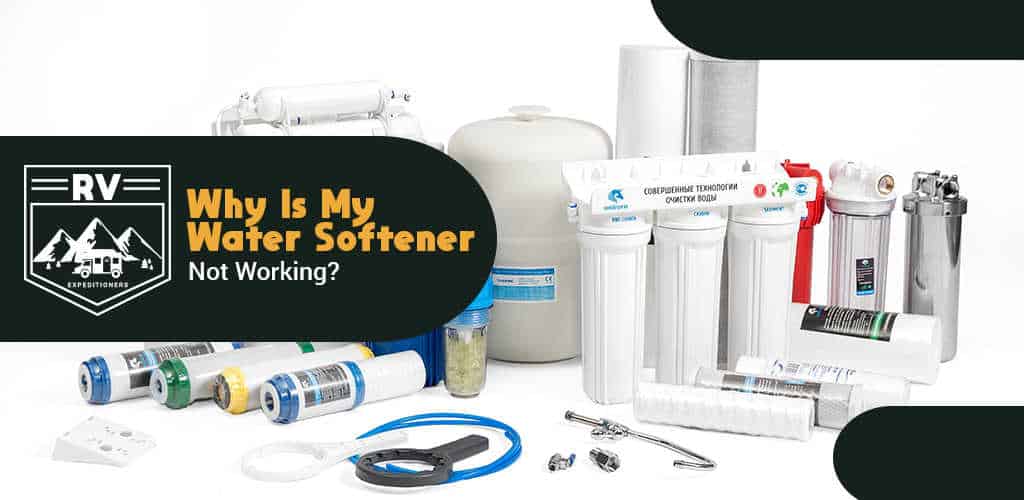Water softening is the process of removing unwanted metal cations such as magnesium and calcium from water. Its purpose is to prevent the formation of hard water deposits which can be unhealthy and damaging to plumbing and fittings.
Before going any further, a word of caution here as dealing with hard water and scale buildup is bad enough in a regular home. If you’ve adopted the RV lifestyle, a water softener is one of the first investments you should make if you want to maintain a clean and low-maintenance RV.
Common Causes for Water Softeners Not Working Properly
For this discussion, we’ll be talking about salt-based water softeners, which are still the only real water softeners available for commercial use. The other types of water softeners employ different ways to neutralize those heavy metal cations (so that they don’t react with certain anions and become limescale) but they don’t actually remove the heavy metals like salt-based water softeners.
1. Blockages
Blockages can happen but not as often in a rv water softener system. That’s because blockages are more likely if you’re using a lot of water, like early morning at a typical home. In an RV, it’s harder for small deposits to clamp up together and create big blockages.
2. Resin beads
Resin beads are a mainstay of salt-based water softener systems. Cleaning the resin bed or replacing the beads may be necessary. To know if these are the culprits preventing your water softener from working, simply check for small particles floating in your water. If you see any, it’s likely that the beads are breaking up.
3. Salt bridges
If your water softener appears to be working yet not having any effect on the water, a salt bridge might be the reason why it’s not having the intended effect. Salt buildups inside the water tank are rare but not uncommon.
A salt bridge affects the softener’s regeneration cycle. This can be easily solved by opening the brine tank and breaking up the salt bridge. Don’t put your hand in there – use a stick or something long enough and hard enough.
A chemical solution can also work and sometimes even better. That’s because you’ll also have to clean the salt buildup on the edges of the tank.
4. User error
Why is my water softener not working? Have you considered that you haven’t paid enough attention to the system?
Water softeners need servicing from time to time. You may need to add salt, clean the tank and filters, etc. If you haven’t performed those tasks properly, chances are that the water softener is not going to operate efficiently.
5.Motor issues
Cheap water softeners may come with cheap motors. Evidently, it’s not a stretch to think that a motor can break down over time. If your water softener doesn’t seem to “turn on,” you might suspect the motor.
How to Avoid Water Softener Problems
1. Using the right salt
Use pure salt with iron remover that’s made specifically for water softeners. Avoid rock salt because of the contaminants which may hinder the water softener’s functionality, even though it’s more affordable,.
2. Be careful when refilling
Don’t rush to refill the salt in the tank until there’s almost nothing left. Also, it’s best not to exceed two-thirds of the tank when filling it with salt.
3. Clean the resin bed
You can use Iron-Out or similar cleaning products to clean the resin bed.
4.Clean the brine tank
You shouldn’t let a year go by without cleaning the brine tank. Even if you’re using the highest quality softener salt, enough contaminants may form in the tank in the long run.
5. Call a specialist
Here’s what can happen if you don’t take care of your water softener system. It can break down so badly that you’ll have to call a specialist to look at it. Repairs may cost $200 or more, but that’s still better than having to buy a new water softener for your RV, maybe.
FAQ's
What to do if a water softener is not working?
If your water softener is not working, check the fuses, and then check the water valves. Check the wires connecting the valves to the water softener. Make sure they are connected firmly, and that the wires are in good condition.
Can you run water while the water softener is regenerating?
No, you can't run water while the water softener is regenerating. The regeneration process will take 2 hours. and it will use up all of the salt in the water softener. Also, the hard water will fill up the water heater which can result in buildup in the equipment.
Closing Thoughts
Unless you’re really tight on cash or you don’t use the RV often enough, there’s no reason why you shouldn’t get a water softener for your RV. There are plenty of models on the market designed specifically for RVs.
This means that they’re cheaper and lighter, and designed to fit in tight spaces.
But, it doesn’t mean that they’re less useful or lower maintenance than your home water softener system.
While the softener does most of the work, you’re almost equally responsible for the quality of the water.
After all, the water softener works based on what you put in it and how well you take care of it. Yes, it’s just one more thing in the rv that you have to take care of. But it’s the price you have to pay for traveling in comfort.

